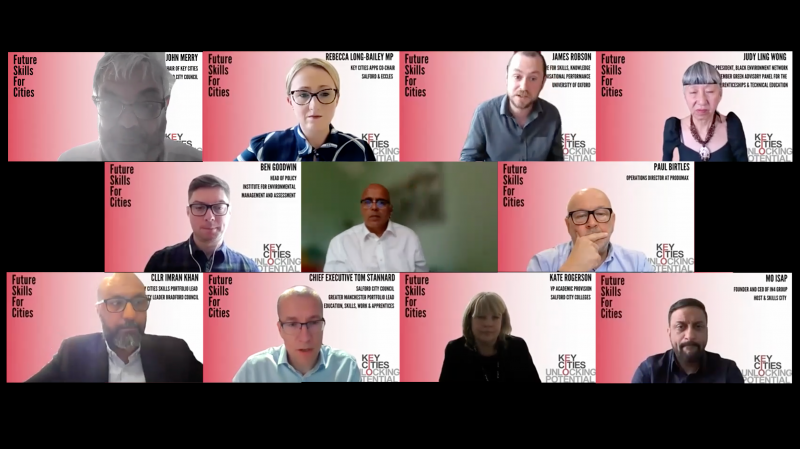Chairing the first session on green skills, Rebecca Long-Bailey, MP for Salford and Eccles and co-chair of the Key Cities APPG, said there was a need for the Government to tie industrial strategy much better into the needs of the economy to ensure the skills we need will be available, adding that the move towards green represents the greatest economic opportunity for the country.
Dr James Robson, co-director of the Centre for Skills, Knowledge, and Organisational Performance at the University of Oxford, pointed to possible tension between short-term and long-term skills needs, emphasising we need technical skills to meet the needs and opportunities of the day as well as long-term transferable skills to enable people to navigate the employment market over their lifetime, and continuing professional development (CPD) remains crucial in this.
Young people are simply not aware of the many opportunities that exist for apprenticeships in a very wide range of jobs that can lead on to well-paid, skilled jobs, said Judy Ling Wong, the president of the Black Environment Network and member of the Green Apprenticeships Advisory Panel (GAAP) for the Institute for Apprenticeships & Technical Education. She highlighted 44 careers from Countryside Rangers and Data Analysts to Software Developers and Project Managers for which apprenticeship standards at levels ranging from 2 to 7 have been endorsed by GAAP. It is important to find better ways of getting information to young people about the opportunities that are out there.
Are we talking about skills for new “green jobs”, or will in future all jobs be green? This was the question asked by Shipley College Principal Nav Chohan, who chairs the West Yorkshire Skills Network. Devolution, he believes, offers a wonderful opportunity to marshall resources for the green economy. “Further education colleges could be the agent of change,” he insisted, “delivering green skills for the future.”
What are the barriers to greening every job in the UK, asked Rebecca?
Ben Goodwin is the head of policy at the Institute of Environmental Management and Assessment (IMEA), which has recently partnered with Deloitte to publish a blueprint on transforming the workforce for the green economy. He argued for campaigning to raise awareness and to make sustainability as ingrained in industry today as happened with health and safety in the 1970s.
Employment opportunities and demand for skills depend on wider economic considerations, with Nav Chohan pointing to the huge upside opportunities if we can figure out how to make economic sense of retrofitting home, which is essential to meet net zero targets.
James Robson warned that higher education and further education should not be seen as competing options for skills development. Both have important roles to play and it is necessary to look for complementarity.
In the discussion that followed a number of questions were raised and explored. What green jobs and clusters will appear where in the network of Key Cities? What does each city have to offer in terms of training, apprenticeships and job opportunities? Is there scope for a network of opportunity finders for Key Cities, an online Skills House across the network?
Councillor Imran Khan, deputy leader of Bradford City Council and Key Cities portfolio lead on Young People, Skills and Education, chaired the second session on “Skills for life – never too late”. He said that local authorities must be at the centre of skills development. Cllr Khan emphasised the importance of lifelong learning and of simplifying the offer, which is the aim of Skills House in Bradford, which offers a single point for accessing local services.
Partnerships to support school leavers and adult learners are the key to success, said Tom Stannard, Chief Executive of Salford City Council and Greater Manchester portfolio lead on Education, Skills, Work & Apprentices. He highlighted the need for a plurality of providers working with industry, including but not only higher education, and bemoaned the absence of a national strategy for information and brokerage to help working-age people in under-skilled sectors to retrain for the sectors of the future.
There is value in learning for learning’s sake, Tom argued, and not stripping out subjects that don’t directly lead to skills that are currently in demand. There are pathways for specific skills which lead directly to jobs, but also for transferable skills and retraining to help people navigate employment opportunities over time. Overall, the priorities should be to devolve the system and upscale the funding, to improve people’s ability to navigate and make it less complicated to get around the system. Adult education, he believes, is one of the most important drivers of ongoing economic success and development.
Kate Rogerson, vice-president for academic provision at Salford City Colleges, echoed the need for partnership and the lack of awareness that had been highlighted by several contributors. It was important, she said, to foster an ecosystem where partners are aware of what Salford City Colleges have to offer and equally the colleges are aware of what provision is needed from them. Bringing adults into learning offers multiple benefits to them and to wider society, she said. Show adults what they can do and where they can go, and celebrate the value of lifelong learning.
An industry perspective was offered by Paul Birtles, Operations Director at Produmax, a precision engineering company near Bradford which supplies some of the top aerospace manufacturers. Produmax has actively promoted apprenticeships leading to jobs, working with the City Council and the local colleges. A big question is what is needed not just now but in ten years’ time. There is a growing need for more local supply chains and this is where business and colleges can work together.
People need to be incentivised that when they train there will be an outcome, said Mo Isap, the Founder and CEO IN4 Group, HOST & Skills City. Leadership needs to be demand-led. If we want to make progress in cities, he said, the question is how can we upskill and reskill hard-to-reach groups? Tech is not a “core skill”, he said. It is a question of lifelong learning, because tech skills needed today will be redundant tomorrow and the ability to constantly learn new skills is what counts. He agreed that people just don’t have an idea of what is available, something which Skills City is attempting to address with its seven digital skills bootcamps with a guaranteed job interview at the end.
Cllr John Merry, closing the conference, welcomed the discussion and the wide range of contributions. We are, he said, determined as a network to deliver and believe that if we are given the tools, we can do the job. The conference deliberations will feed into work being done by the Key Cities APPG with the aim of developing constructive engagement between cities and Government around skills.
View the Conference here:



